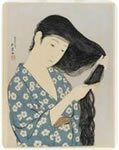The black-haired weaver

Autumn night. Without a scream A crow passes by. Kishi
A long, long time ago, in the city of Kyoto, there lived a samurai who was married to a beautiful, kind-hearted woman who was also an excellent weaver.
Fate wanted the samurai to lose its place: his lord died and he became a jobless warrior, a ronin. Although the woman sold the fabrics, the money was not enough. They did not live in poverty, but could no longer maintain the same status. Filled with shame, the samurai despaired.
One fine day he packed his possessions and put his sabers around his waist.
“I’m leaving,” he told the woman. “This is not life for a man like me!” I can’t stand this dishonor. Get another husband, I’ll be looking for luck elsewhere.
Washed in tears the woman pleaded:
– I ask you not to abandon me. I will weave even more and sell more and more!
But the samurai had a closed heart. The woman was crying, her long black hair flowing over her shoulders, but he tightened his sandals, mounted his horse, and left without looking back.
He went to a faraway city, where he finally entered the service of a new lord. Thanks to his qualities, he quickly became noticed and soon became one of the closest servers of the master. Now he had a spoiled, selfish daughter. “If you marry her, the samurai thought, my fortune is made.” So, taken by interest, he made her court and knew how to fall for her. The wedding was a reason for big parties. Then everything returned to normal, as before.
The new woman spent her time in front of the mirror, shaving her eyebrows and trying on countless expensive dresses, while the samurai served the lord and covered himself in battle, thanks to his saber, spear, and bow. He also accompanied his wife when she was taken from litter from store to store to buy fabrics, dresses, ornaments and jewelry. Standing in the street beside the porters was irritated by the vanity and futility of their occupations. And she couldn’t find joy in that rich life she’d dreamed so much.
More and more came to mind his first wife. At night, he saw his beautiful face, his sweet eyes shining with affection for him, his long black hair falling over his shoulders. I heard the tapping of the loom where she wove the wonderful fabrics. He extended his arms to her and woke up shattered, feeling bored by all that surrounded him.
After a while, dreams came to assail him during the day. As he waited for his wife to finish her eternal shopping, the first wife’s face appeared before him, with her smile, fine features, delicate hands, black hair. Those images came back and disturbed him more and more, resurrecting his love and desire. At night, bitter tears covered her eyes. Now he knew that, obsessed with success, he had committed madness. He had rejected her lover, and he loved him, had sacrificed her to seek wealth and power. Fully aware of this, he decided to abandon that artificial existence, to go back to the true woman and ask her forgiveness.
One night he mounted his horse and took the path to Kyoto.
After several days of travel, he arrived in town shortly before midnight. He went through dark, deserted streets like tombs and, with a pounding heart, made his way to his old abode. He entered the courtyard. The herbs were tall. In the moonlight, he found that the wallpaper was torn in places. “Yes, he told himself, life wasn’t easy for her, but now that I’m back, I’ll remedy everything. Yes, everything will be fine.”
He tied his horse, climbed the steps, took off his sandals, pushed open the door and entered. He went through the rooms of the house, and then heard the regular tapping of the loom. The samurai’s heart skipped a beat. He opened one last door. His wife was sitting in front of the large loom, dressed in a patched dress, her beautiful black hair cascading over her shoulders and back. He turned and saw him. A bright smile lit her beautiful pale face. She ran to her husband who took her right in his arms.
“Forgive me,” he said, crying. “Forgive me, I was a fool.” But I’ll make up for lost time, I swear to you!
– Chiiiuuu! – she murmured, also in tears, – chiiiuuu! It doesn’t matter now. My prayers have been heard. You came back. Come, come!
They spent the night talking, laughing and crying, hugging each other, while the candles burned and went out. Until the samurai eventually fell asleep, overcome by sleep. In the morning the sun’s rays awakened him. He opened his eyes. The star shone straight ahead through the holes in the roof: a large, rotting part had fallen. He rubbed his eyes, but was not dreaming. The sun was full of it. Stunned, he looked around.
There was mold on everything, the torn paper on the walls and the fallen beams. On the decayed wooden floor weeds grew herbs. In the middle of the room was a broken loom. Beside him was the woman lying with her back to him, her slender shoulders wrapped in patched kimono, her long hair falling down her back to the floor. Holding her by the shoulders, he turned her to him and… it was just a skeleton he saw. It had been a long, long time since his dear wife had died of heartbreak, loneliness, and longing. Rafe Martin “Les cheveux noirs” in 10 contes du Japon Paris, Beaver Poche Flammarion, 2000 [1 ] Being ronin consisted of living on pilgrimage, taking care of small services, usually in exchange for the meal of the day and the practice of samurai arts.



